
Women's Mental Health Statistics 2026: Anxiety, Depression & Treatment Gaps
Explore 2026 women's mental health statistics including depression rates, anxiety prevalence, postpartum mental health data, and treatment gaps. Research-backed facts every woman should know.

Couples Counseling Intensives: How One Full Day Can Transform Your Relationship
Couples counseling intensives compress months of weekly therapy into focused full-day sessions. Research shows 70-98% of couples report significant improvement. Learn what happens during an intensive, who they're best for, and how to prepare.

Discernment Counseling: A Complete Guide to Finding Clarity When You're Unsure About Your Marriage
Discernment counseling helps couples on the brink of divorce gain clarity. Learn how this 1-5 session process works and who it's right for.

Anticipatory Grief: Grieving Before the Loss Actually Happens
Anticipatory grief is the pain of mourning someone before they're gone. Here's what it looks like, how to cope, and what to expect when death finally comes.

Grief After Losing a Parent: What No One Tells You About This Unique Pain
Losing a parent changes your place in the world—no matter your age. Here's what research says about parental grief and how to find your way forward.

The 7 Stages of Grief: What to Actually Expect
The 7 stages of grief offer a more complete picture than the old 5-stage model. Here's what to actually expect—and why your grief won't follow a straight line.
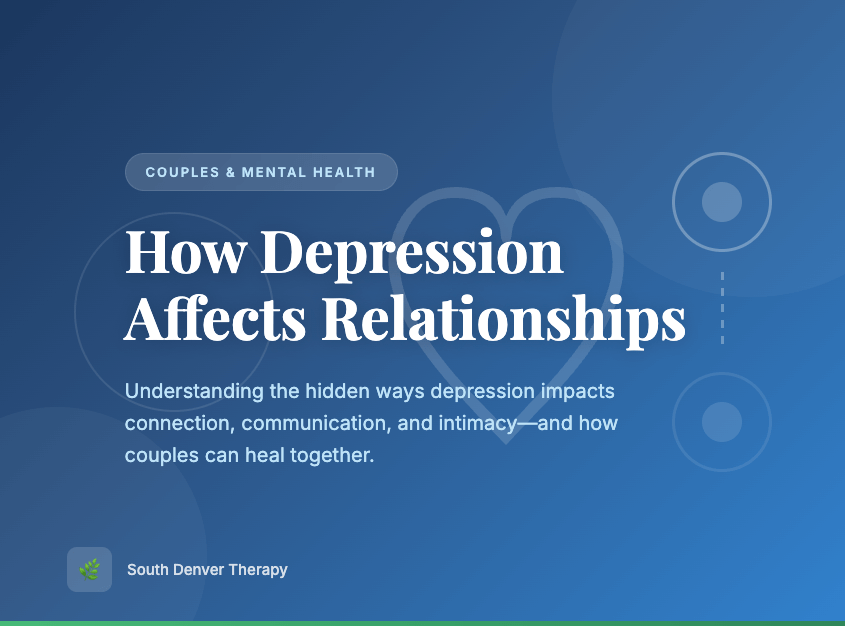
How Depression Affects Relationships: A Guide for Couples
Depression doesn't just affect one person—it changes how couples communicate, connect, and care for each other. Here's what both partners need to know.
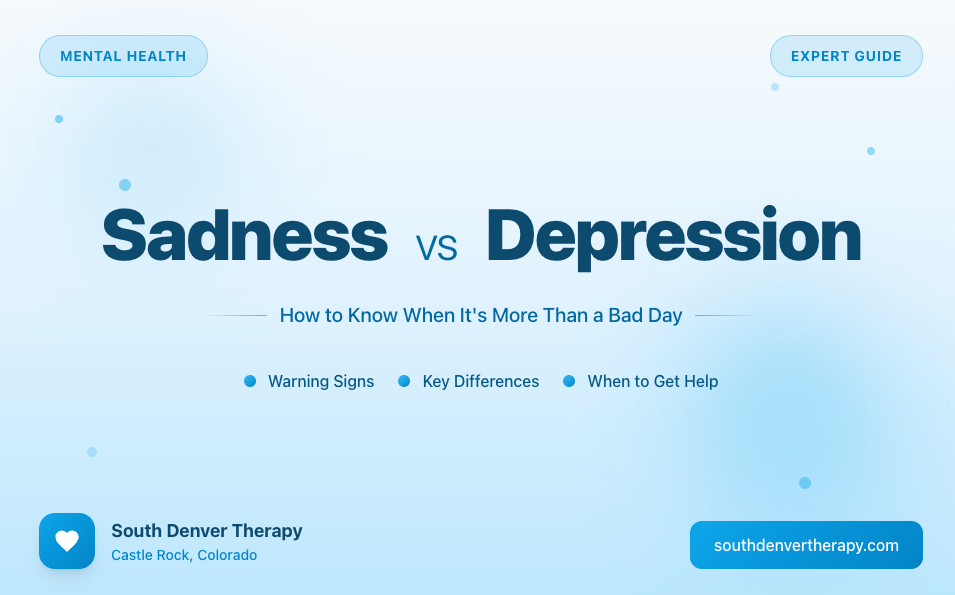
Depression vs. Sadness: How to Know When It's More Than a Bad Day
Everyone feels sad sometimes. But when does sadness cross the line into depression? Learn the key differences, the warning signs that something deeper is going on, and what to do if you think you might be depressed.

Depression Statistics: What the Numbers Reveal in 2026
Discover how depression affects Americans in 2026. From rising prevalence to demographic insights, these statistics reveal key trends and implications for mental health.

Anxiety in Men: Why It Often Goes Undiagnosed
Men are 4 times more likely to die by suicide than women, yet less likely to seek treatment for anxiety. The problem? Anxiety in men often looks like anger, irritability, or substance use—not the "typical" symptoms we expect. Learn the 10 hidden signs.
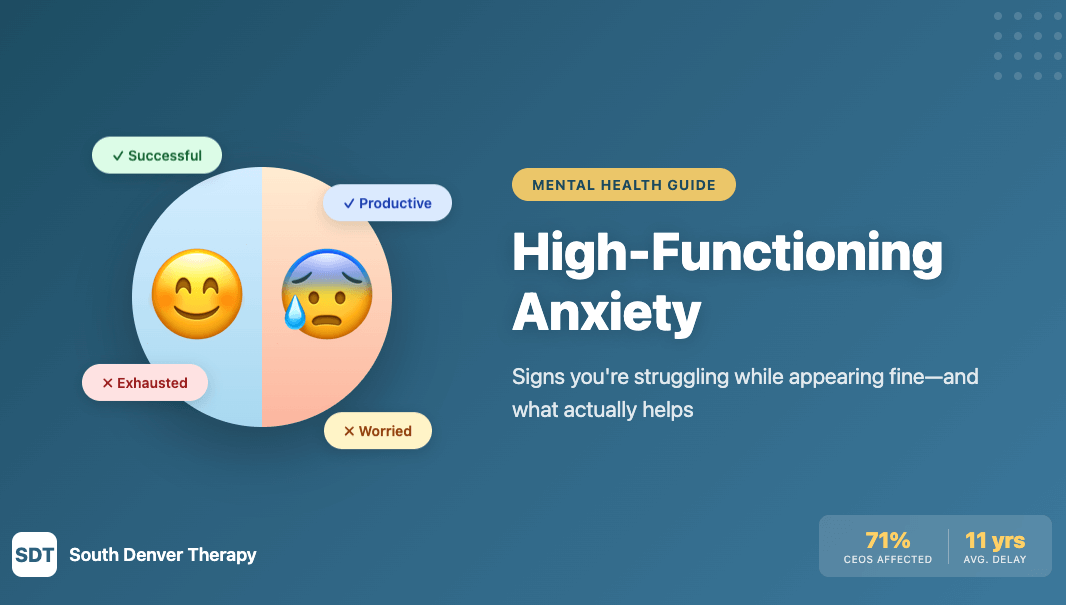
High-Functioning Anxiety: Signs You're Struggling While Appearing Fine
71% of CEOs experience imposter syndrome. 11.5% of people have anxiety but don't recognize it. If you're achieving but exhausted, you may have high-functioning anxiety. Learn the 10 hidden signs.
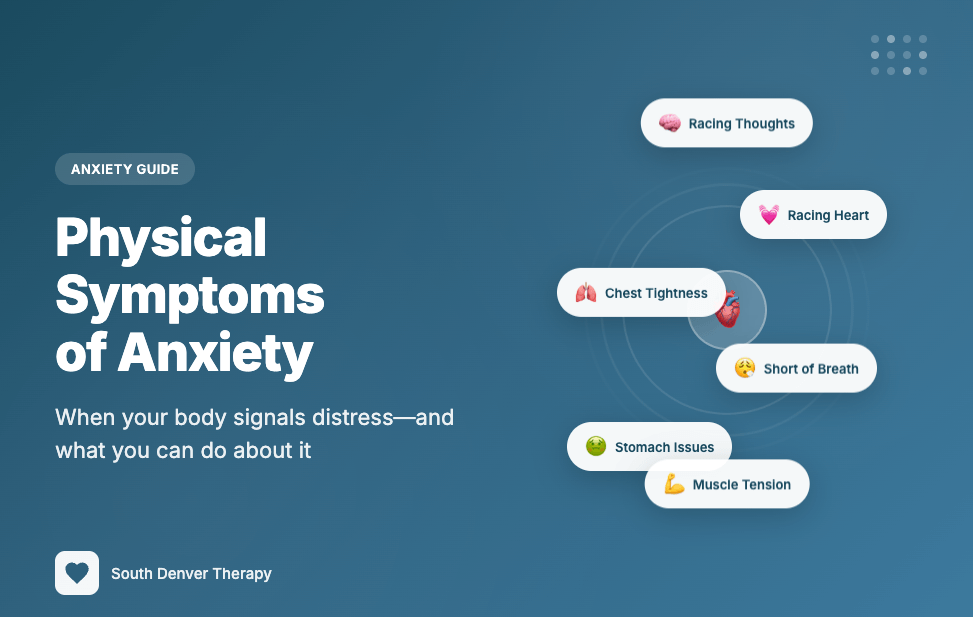
Physical Symptoms of Anxiety: When Your Body Signals Distress
Up to 40% of emergency room visits for chest pain are caused by anxiety—not heart problems. Learn how anxiety shows up in your body, from racing heart to stomach issues, and what you can do about it.
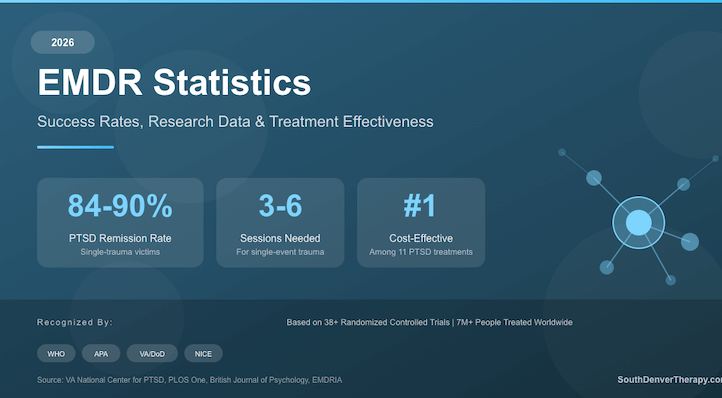
EMDR Statistics 2026: Success Rates, Research & Effectiveness Data
Does EMDR actually work? The research says yes. Studies show 84-90% of single-trauma victims no longer have PTSD after just 3 sessions, and EMDR ranks #1 as the most cost-effective treatment. Here's what the latest 2026 research reveals about EMDR success rates, treatment timelines, and effectiveness across different conditions.

Infidelity Statistics 2026: Cheating Rates, Affairs & Research Data
How common is cheating really? Current research shows 20% of married men and 13% of women admit to infidelity—but those numbers climb to 45% when emotional affairs are included. Here's what the data reveals about affairs, why they happen, and how marriages recover.

Marriage Statistics 2026: Divorce Rates, Age Trends & Key Facts
The U.S. divorce rate has dropped to its lowest point in over 50 years while Americans are marrying later than ever. Here's what the 2026 marriage and divorce statistics actually show—and what it means for your relationship.

10 Proven Strategies for Making Long-Distance Relationships Thrive in 2026
Long-distance relationships require different skills than geographically close ones—but "different" doesn't mean "impossible." These ten research-backed strategies help couples not just survive the distance but use it to build deeper connection.

Psychedelic Therapy for Couples: MDMA, Psilocybin & Ketamine
Can MDMA, psilocybin, or ketamine help couples reconnect? Heres what 2026 research says about psychedelic-assisted therapy for relationships - and the risks.

How Couples Meet: Where Most Couples Find Love in 2026
Finding love in 2026 looks very different from a decade ago. With online dating dominating the scene, workplace romances, mutual friends, and chance encounters still play a role in bringing couples together. But where do most couples meet their spouse today? In this article, we explore the latest relationship statistics, the top ways people find love, and the emerging dating trends shaping modern relationships. Whether you're swiping right, meeting through mutual friends, or sparking a connection at a coffee shop, discover how couples are forming lasting bonds in today's digital world.

15 Gratitude Exercises for Couples That Actually Strengthen Your Bond (Research-Backed)
Gratitude is the #1 predictor of marital quality according to research. These 15 exercises—from 30-second daily habits to deeper weekly practices—will help you and your partner feel more connected and appreciated.

50 Relationship Check-In Questions That Bring Couples Closer (Plus How to Actually Use Them)
Weekly relationship check-ins prevent disconnection. Use these 50 conversation starters for meaningful talks about your relationship.